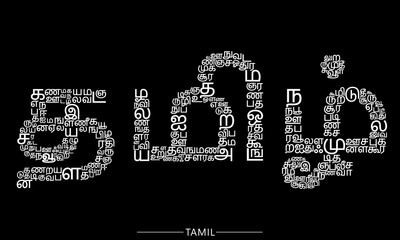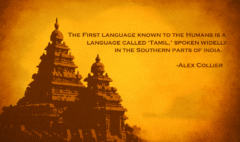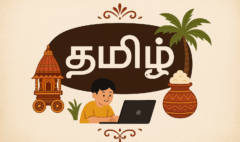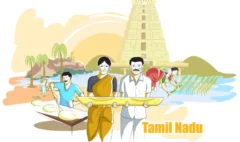An Introduction to the Tamil Judicial System and Legal Terms
An Introduction to the Tamil Judicial System and Legal Terms
An Introduction to the Tamil Judicial System and Legal Terms: The Language of Justice
The system of law and justice is a foundational pillar of any civilized society. It is a complex world with its own unique language, a vocabulary that is designed to be precise, authoritative, and unambiguous. For students of law, political science, or for any citizen who wishes to have a deeper understanding of the workings of their society, a basic knowledge of legal terminology is essential. In the state of Tamil Nadu, while the higher courts may conduct much of their business in English, the Tamil language plays a vital and growing role in the judicial system, especially at the local level. An understanding of the key legal terms in Tamil is a crucial aspect of Tamil for legal studies and for a more complete civic education.
This guide will serve as a basic introduction to the world of Tamil law (சட்டம் – Caṭṭam). We will explore the structure of the judicial system and will provide a glossary of the most essential judicial vocabulary. This is a journey into a more formal and sophisticated realm of the Tamil language, the language that defines our rights, our duties, and our pursuit of justice.
The Structure of the Judicial System in Tamil Nadu
The judicial system in Tamil Nadu, like in the rest of India, is a unified and hierarchical one, with the Supreme Court of India at its apex. The primary court of the state is the Madras High Court, located in Chennai, which is one of the oldest and most respected high courts in the country.
The Hierarchy of Courts:
- Supreme Court of India – இந்திய உச்ச நீதிமன்றம் (Intiya ucca nītimaṉṟam)
- High Court – உயர் நீதிமன்றம் (Uyar nītimaṉṟam) – The Madras High Court (சென்னை உயர் நீதிமன்றம்) is the highest court in the state.
- District Court – மாவட்ட நீதிமன்றம் (Māvaṭṭa nītimaṉṟam) – These are the primary courts of original jurisdiction in each district.
- Subordinate Courts – சார்பு நீதிமன்றங்கள் (Cārpu nītimaṉṟaṅkaḷ) – These include a range of lower courts that handle specific types of cases, such as civil or criminal matters at the local level.
- Magistrate Court – நடுவர் நீதிமன்றம் (Naṭuvar nītimaṉṟam)
The Key Players in the Courtroom
A courtroom is a stage with a very specific cast of characters, each with their own title and role.
- Court – நீதிமன்றம் (Nītimaṉṟam)
- Judge – நீதிபதி (Nītipati)
- Lawyer / Advocate – வழக்கறிஞர் (Vaḻakkaṟiñar)
- Plaintiff / Complainant – வாதி (Vāti) – The person who files the case.
- Defendant – பிரதிவாதி (Pirativāti) – The person against whom the case is filed.
- Witness – சாட்சி (Cāṭci)
- Police – காவல்துறை (Kāvalturai)
- Accused – குற்றவாளி (Kuṟṟavāḷi)
Fundamental Legal Concepts and Terms
This is the core judicial vocabulary that is used to describe the processes and the principles of the legal system.
The Law and Justice:
- Law – சட்டம் (Caṭṭam)
- Justice – நீதி (Nīti)
- Right(s) – உரிமை (Urimai)
- Duty – கடமை (Kaṭamai)
- Constitution – அரசியலமைப்பு (Araciyalamaippu)
- Democracy – ஜனநாயகம் (Jaṉanāyakam)
– Government – அரசாங்கம் (Aracāṅkam)
Civil and Criminal Law:
- Civil Law – உரிமையியல் சட்டம் (Urimaiyiyal caṭṭam) – Deals with disputes between individuals or organizations (e.g., property disputes, contracts).
- Criminal Law – குற்றவியல் சட்டம் (Kuṟṟaviyal caṭṭam) – Deals with crimes and offenses against the state.
- Crime – குற்றம் (Kuṟṟam)
- Case / Lawsuit – வழக்கு (Vaḻakku)
– Complaint – புகார் (Pukār)
– Petition – மனு (Maṉu)
Courtroom Processes:
-
– Investigation – விசாரணை (Vicāraṇai)
– Evidence – ஆதாரம் (Ātāram)
– Proof – சான்று (Cāṉṟu)
– Argument – வாதம் (Vātam)
– Judgment / Verdict – தீர்ப்பு (Tīrppu)
– Sentence / Punishment – தண்டனை (Taṇṭaṉai)
– Fine – அபராதம் (Aparātam)
– Imprisonment – சிறைத்தண்டனை (Ciṟaittaṇṭaṉai)
– Bail – ஜாமீன் (Jāmīṉ)
– Appeal – மேல்முறையீடு (Mēlmuṟaiyīṭu)
The Language in Action: The Use of Tamil in the Courts
The official language of the Madras High Court is English. However, there has been a long-standing and passionate movement to have Tamil recognized as an official language of the High Court, reflecting the deep connection between the language and the identity of the state. In the subordinate courts across Tamil Nadu, Tamil is extensively used in the daily proceedings. Petitions can be filed in Tamil, witnesses can give their testimony in Tamil, and lawyers can argue their cases in Tamil. The judgments of these lower courts are also often delivered in Tamil.
This makes a functional knowledge of these legal terms in Tamil essential for any lawyer who wishes to practice in the state. For the common citizen, understanding these terms is crucial for being able to read a legal document or to follow the news about an important court case.
Conclusion: The Vocabulary of Rights and Responsibilities
The language of the law is the language of our rights, our responsibilities, and the very structure of our society. An introduction to the world of Tamil law and its specific vocabulary is a powerful and empowering lesson in civics and in the advanced, formal register of the Tamil language. This judicial vocabulary is more than just a collection of words; it is the terminology that underpins the quest for justice and order in our society. For any serious student of the Tamil language and culture, an understanding of these essential terms is a crucial step towards a more complete and nuanced understanding of the modern Tamil world.











